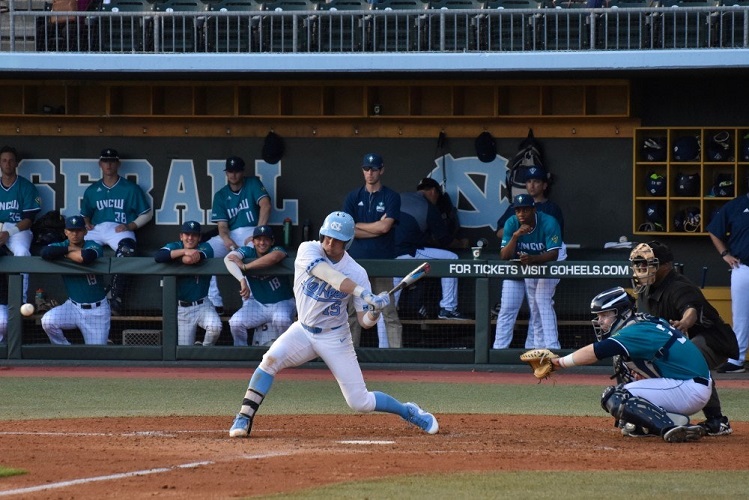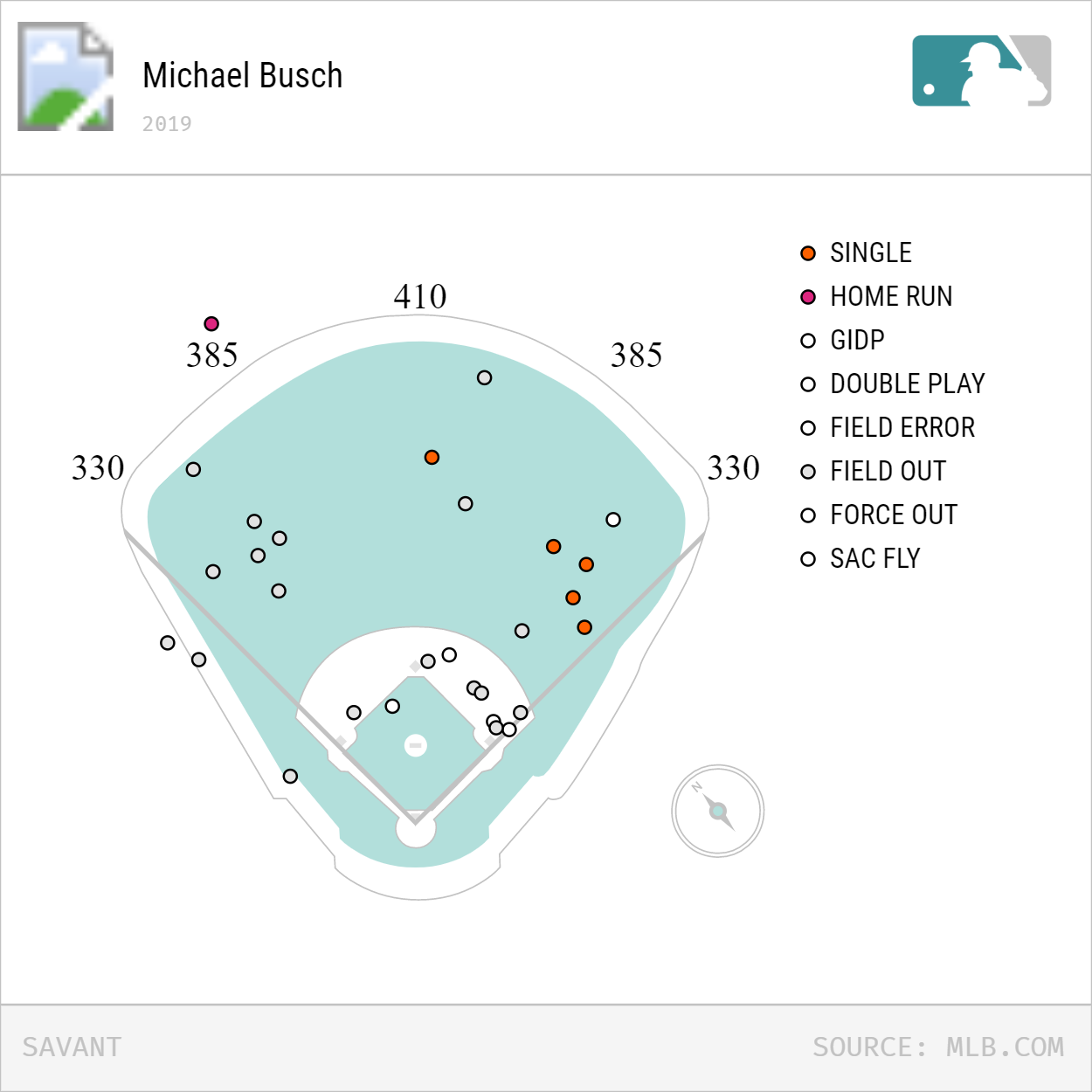Welcome to the beginning of the Top 10 of Dodgers Digest’s prospect countdown. We begin with Michael Busch, a guy who could end up having the best hit tool in the system very soon.
——
Previous Entries
——
I’ve included Future Value (FV) grades and risks for the Top 50 prospects. For example, if a guy gets a “50 low,” he has a really good chance to be an average player at his position. If a guy gets a “55/High,” there’s a good chance he won’t reach that ceiling, but the potential is there. The grades are 20-80 (50 is average), and the risks are as follows:
- Low: Players who are usually older, have debuted, are relievers and/or have higher floors than ceilings
- Medium: Players who are a mix of younger and older, usually have higher floors
- High: Players who are usually younger with potential, but also question marks
- Extreme: Players who are generally younger with star potential, but a ton of question marks
This is to show what value a player might provide at the MLB level. The higher the risk, the less likely a player will reach that ceiling.
——
Editor’s Note: I am not a scout (#notascout). I am an amateur when it comes to evaluating players. I don’t claim to be a pro, I just want to pass along the information I observe/obtain to the people. Notes and comments are based on personal observation, talking to sources, reading scouting reports and watching video. For future entries in this series: All ratings in the charts below are on the standard 20-80 scouting scale, where 50 is roughly average, 80 is elite and nearly unattainable and 20 is unacceptably poor. Enjoy.
Other Notes: “Role” is a realistic future role (slightly optimistic in some cases). Age is the 2020 season age for the player (June 30 is the cutoff date).
——
Rating Key
| 80 — Elite |
| 75 — Borderline Elite |
| 70 — Plus-plus |
| 60-65 — Plus |
| 55 — Above-average |
| 50 — Average |
| 45 — Fringe-average |
| 40 — Below-average |
| 30-35 — Poor |
| 20-25 — Very Poor |
10. Michael Busch
| DOB: 11/9/97 | Age: 22 | Height: 6’0 | Weight: 207 | Bats: Left | Throws: Right | Position: 2B/1B/OF |
Acquired: First round supplemental, No. 31 overall of 2019 MLB Draft, University of North Carolina, $2,312,000 signing bonus
Physical description: Solidly built, athletic
Strengths: Good bat-to-ball, great plate discipline, developing power, defensive versatility
Weaknesses: Injury concern, lack of experience at 2B, abbreviated pro debut
Key statistics: .125/.371/.125, 20.0 BB%, 14.3 K%, .000 ISO (A/AZL)
Role: Everyday player with defensive versatility
Player comparison: Max Muncy (with less power)
Summary: After taking Kody Hoese at No. 25 in the 2019 MLB Draft, Busch was a somewhat surprising selection six picks later. He was the compensatory selection the Dodgers received for failing to sign right-handed pitcher JT Ginn the previous year. Busch hit .284/.436/.547 with North Carolina, but his professional debut (35 plate appearances between AZL Dodgers and Great Lakes) was limited due to a broken right hand sustained shortly after. He did get an additional 22 plate appearances in the Arizona Fall League and hit .231/.545/.462 with a homer and a 9:4 BB:K ratio.
At the plate, he swings a good stick from the left side and produces plenty of bat speed. That, in turn, produces a lot of line drives because of his balanced and level swing. It’s a quiet and compact setup and swing with a very modest leg kick. That helps him control the bat and barrel — something not a lot of hitting prospects can do. There’s not a lot of hand movement, but they are quick when he swings. He keeps his front shoulder closed against lefties, which will should help him against advanced southpaws. Although the batted ball data is limited, Busch does a good job keeping the ball elevated. Of the 19 balls he put in play, only four of them were grounders (with the others being fly balls, line drives or popups). That bodes well for his future in the system, as the Dodgers preach launch angle.
Busch played mostly first base and left field in college, so when the Dodgers announced him as a second baseman, that was a bit surprising. The early reviews have been mixed for him. He has decent range and the throw from second base is one of the easier ones, which is good because he doesn’t have a strong arm. However, he’s definitely going to be reliant on shift data and positioning — at least early on. He won’t be mistaken for Ozzie Albies, but if the Dodgers can turn Muncy into a passable second baseman, a more athletic version of him should have a better chance of sticking there long-term and more frequently. But the Dodgers love defensive versatility, so expect Busch to get work at first base and left field on his way to the majors.
The comparisons to Muncy are always going to be there. Busch probably won’t develop into the 30-plus home run hitter that Muncy has, but he won’t swing and miss as Muncy does, either. He could still be an offensive threat because of his great strike zone judgment and the ability to spray line drives all over the field. Some of those liners will turn into over-the-fence fly balls. He’s likely to begin the season with Great Lakes, but a jump to Rancho Cucamonga is all but assured after a month or two. He’s an advanced hitter who could move quickly. He profiles as an everyday player because of the bat.
Spray Charts
Video
Video courtesy of Perfect Game.
| Tool | Present | Future |
| Hit | 40 | 60 |
| Power | 35 | 50 |
| Speed | 50 | 45 |
| Defense | 40 | 50 |
| Arm | 40 | 45 |
| FV/Risk | 55 | High |
2019 Ranking: 13 (Midseason)
2020 Location: Low-A Great Lakes
ETA: 2023
——
Next Up: Prospect No. 9
 Dodgers Digest Los Angeles Dodgers Baseball Blog
Dodgers Digest Los Angeles Dodgers Baseball Blog

